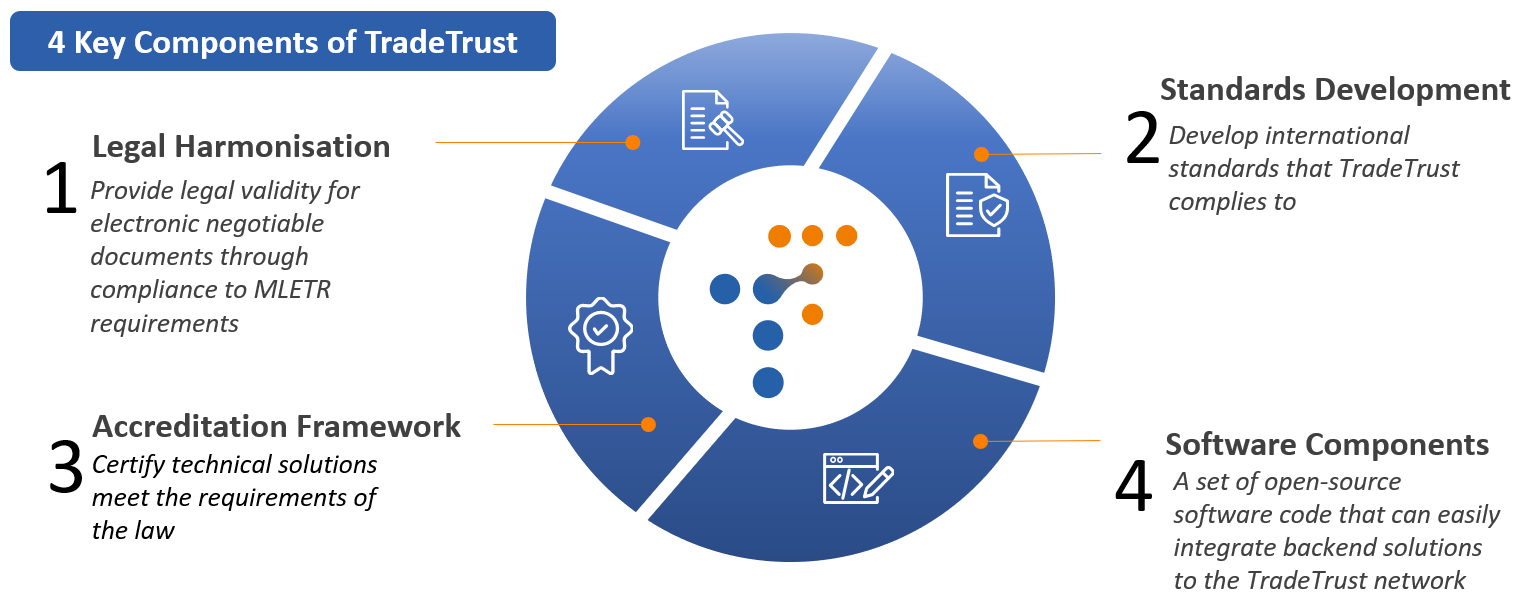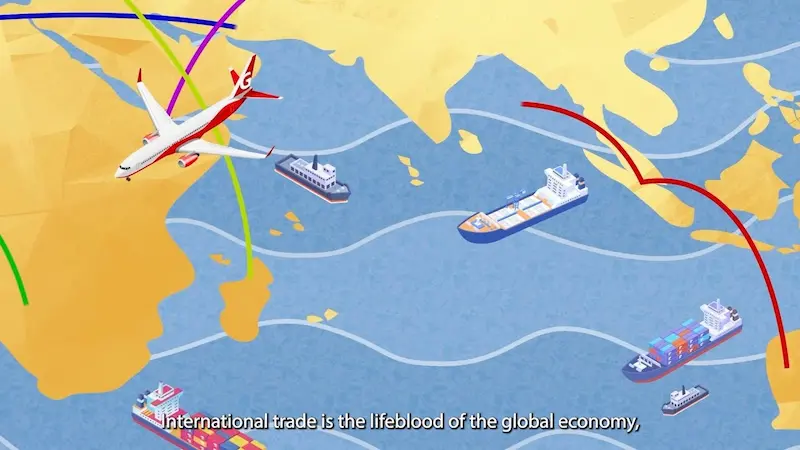About
TradeTrust is a framework that standardises digital trade, providing enhanced security and legal certainty. It reduces the inefficiencies and complexities of cross-border trade that arise from traditional paper-based documentation, such as bills of lading. By lowering operating costs and fraud risks whilst accelerating the digitalisation of cross-border trade processes, TradeTrust promotes trade growth. It is one of the several Digital Utilities.
The framework comprises globally accepted standards that enable trusted interoperability of electronic trade documents across digital platforms. Offered as a digital utility, TradeTrust allows users to endorse, exchange and verify documents, as well as effect title transfers seamlessly across different digital platforms.
TradeTrust can be utilised to digitalise two categories of documents used in cross-border trade:
- Verifiable Documents such as the Certificate of Origin where the provenance and authenticity of the e-document can be easily verified by any party; and
- Transferable Documents such as Bill of Lading where the e-document’s title ownership can be transferred from one party to another.
For Transferable documents, TradeTrust has been developed to meet the requirements of the UNCITRAL The Model Law on Electronic Transferable Records (MLETR) which has been adopted into Singapore’s legislation - Electronic Transactions Act (ETA) in 2021. TradeTrust enables adopters to easily implement ETRs like electronic Bill of Lading that comply with the requirements under MLETR, Singapore’s ETA, UK’s Electronic Trade Documents Act (ETDA) and US laws (New York and Delaware) and hence are legally valid across multiple platforms and systems. TradeTrust’s open-source code is available free and can be easily integrated into any existing system of businesses and solution providers to create and verify documents in support of viable use cases.
TradeTrust has partnered with authoritative International Organisations such as UN/CEFACT and W3C to ensure that TradeTrust technical methods are compatible with existing standards and where appropriate, drive their acceptance as an international standard through the organisations’ respective open and neutral standards development processes. In addition, TradeTrust is advocated as the key interoperability mechanism for trade in several notable publications by WTO and ICC.
Working with various agencies and industry partners both locally and overseas, Singapore seeks to develop an interoperability framework, “TradeTrust”, for the exchange of digital trade documentation. This will enable a more seamless and efficient flow of goods between digitally inter-connected trading partners.


Aim
TradeTrust aims to reduce inefficiencies and complexities of cross-border trade arising from the current paper-based documentation, such as the bill of lading. This lowers operating costs for businesses and the risk of fraud while accelerating the digitalisation of cross-border trade processes thereby promoting more growth in trade.
Benefits
- Reduce the risk of receiving fake documents/information as sources will be accredited. Removes the need for repetitive checks by the various trade ecosystem parties to ascertain whether the documents/information received are legitimate.
- Digitalising paper documents would eliminate costs associated with printing, including the handling and transportation of typically hundreds of pages amongst numerous parties. This will significantly reduce the costs of shipping.
- Current digitalisation efforts are fragmented digital ecosystems consisting of silo groups of trade parties. TradeTrust will work with the current ecosystem to enable various enterprise and platform systems to be interoperable. Coupled with enabling legal validity of electronic trade documents, this can facilitate the creation of new service offerings.
- TradeTrust could allow the convergence of physical, financial and document chains hence making automation of key processes possible. E.g. automating payments or the release of funds with the use of smart contracts when conditions are met.
Who can use?
TradeTrust will be relevant for all parties involved in cross-border trade and logistics documentation processes, including:
- Shipping lines
- Shippers / Consignees
- Logistics Service Providers
- Financial Institutions providing Trade Financing services
- Trade and logistics related Platform Providers
- Overseas Government Authorities involved in cross-border shipment clearances
Find out more
- Latest updates available at: https://tradetrust.io
- Email your enquiries to: tradetrust@imda.gov.sg
- Download TradeTrust open source codes: https://github.com/TradeTrust
- Download legal article published by Stephenson Harwood LLP on the legal validity and practical use of TradeTrust electronic Bill of Lading: https://tradetrust.io/legality
Use TradeTrust
1. To co-create new service offerings in support of viable use case
If you're from
- Shipping lines
- Shippers / Consignees
- Logistics Service Providers
- Financial Institutions providing Trade Financing services
- Government Authorities involved in cross-border matters
2. Integrate TradeTrust open-source code into your platform/applications
If you're from
- Tech companies
- Solutions providers
- Organisations with in-house platforms
For more info, get in touch with us at: https://tradetrust.io



.webp)